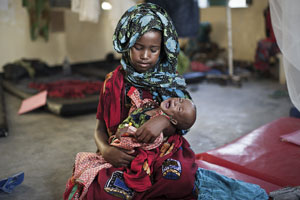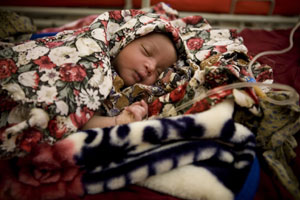
Wednesday, June 06, 2012

Little girl holding her young malnourished sister in the therapeutic feeding centre ward at the hospital MSF runs in Galcayo South. © Sven Torfinn
advertisements
"We give the right care, so people come to us.” Dr Hamida Shakib Mohamed has just helped deliver a healthy baby boy.It’s a good thing the mother made it to this health centre – her labour was difficult and she needed the assistance of a skilled birth attendant.
She lives in a village about 110 kilometers north of here, but her father insisted she make the trip. He appreciates the Médecins Sans Frontières/Doctors Without Borders (MSF) supported services here after his wife was treated for post-partum haemorrhage just a few months ago.
Maternal and obstetric care
MSF expanded its medical services in Galcayo North in December 2011 by adding maternal and obstetric care. The number of deliveries has since boomed to about 200 per month, many coming from increasingly far away.
Dr Hamida is happy about this. She is Somali, educated in Mogadishu in the 1980s, but holds a foreign passport. She has lived abroad for most of the past two decades. "I’m free and I want to give my energy to the Somali community,” she says, now that her children are grown. She could not be needed more.
Insecurity in Somalia
Insecurity in Somalia prevents MSF and others from keeping international staff on the ground for very long and some places are completely inaccessible. Therefore, MSF relies on its Somali staff for the bulk of its work.
It’s a challenge to keep standards up, but through intensive training courses, on-the-job coaching during “flash” visits and advice from experts based outside Somalia, dedicated staff, like Dr Hamida, keep up a high quality of care.
Most of the patients are happy to be here. Almost all of them echo Shamso, who gave birth to her third child last night. “I know I can get good health care here,” says Shamso. It’s also free of charge, a factor that weighs heavily in most of the women’s choices.

A baby rests in the post natal care department of MSF's Galcayo South hospital after developing health complications, March 2011. © Siegfried Modola
Maternal mortality
Shamso is lucky; she didn’t have any complications before or during labour. Somalia has amongst the highest maternal mortality rates in the world and the trials faced by so many other women are immense.
Down the hall, a very young and sad looking woman recovers after losing her child. She arrived two days ago while suffering eclamptic fits – convulsions that can occur during labour. A caesarian section was needed but in Somali culture such a procedure cannot occur without the consent of the husband.
He could not be found in the displaced persons camp on the outskirts of town where they live, and although mobile phones are common in Somalia, no one had his number – not even his wife who now sits quietly next to her daughter. After twelve hours, an uncle from the father’s side consented, but the baby had died by then.
Fistulas
In another room lies a woman who came from Ethiopia after a four day labour. It was too much for the baby, who died shortly after birth. It may have been too much for the mother, too. She lies in a delirious state, chest heaving unevenly, not sure where her baby is. She’s passing urine unchecked and the midwife thinks she may also have a fistula.
Vaginal fistulas are common in Somalia, leaving women in pain and incontinent. The tearing can occur for different reasons, often from obstructed labour and sometimes from rape.
An unaccompanied woman came to Galcayo a few weeks ago from Mogadishu. On the way, she was taken by five men, held for three days and repeatedly raped.
She came in five days later after relatives from the displaced persons camp told her she could get help here. She was too late to receive precautionary prophylaxis for HIV, but we could still counsel her, prevent pregnancy and sexually transmitted infections and address her fistula.
MSF staff in Somalia
Having children can be risky in Somalia, but delivering them can be, too. “Security is shaky,” says Dr Hamida. Last Friday, she was called in at night to assist with a retained placenta. On the way to the hospital, a drunken policeman stopped them waving his AK-47.
He told everyone to get out but, luckily, after pleading that the doctor was needed for an emergency at the hospital, the policeman waved them on. After a blood transfusion, she was able to stabilise the patient. Despite the danger, Dr Hamida is happy to be here and she likes that it’s so busy “because you are achieving something.”
Without the dedicated work of employees like Dr Hamida, MSF could not continue to run programmes in Somalia. Maternal care is only one of MSF’s numerous medical activities throughout the country, but Somalia has extremely high maternal mortality rates – 1,200 in every 100,000 live births, according to various sources.
In other words, more than one mother dies for every hundred children born, so maternal care is an essential part of MSF’s health care package. Having children in Somalia is a dangerous activity, made slightly less so by the huge effort of MSF’s Somali staff.
MSF in Somalia
MSF has been working in Somalia continuously since 1991. MSF relies solely on private charitable donations for its work in Somalia and does not accept any government funding.
In the period from May to December 2011, MSF was running 22 projects in many different parts of Somalia and in refugee camps for Somalis in Ethiopia and Kenya.
In this period, covering the height of the crisis, we treated over 78,500 patients for severe malnutrition and over 30,000 for moderate malnutrition, more than 7,200 patients for measles and vaccinated over 255,000 persons against disease in the Horn of Africa.
MSF assisted in over 6,000 deliveries and provided over 537,500 out-patient consultations.